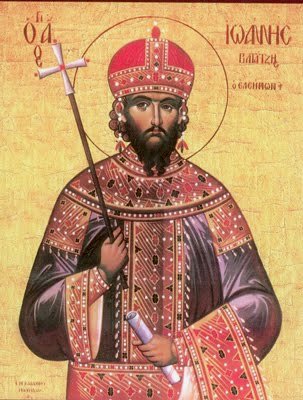|
|
|
John Doukas Vatatzes was born in 1193, at Didimotychon
and his family was of great importance in Thrace. Like other eminent families (Comnenos, Doukas, Angelos, Laskaris),
the Vatatzes family had become prominent in the Byzantine society. After the fall of Constantinople in 1204,
John Doukas Vatatzes escaped to Nymphaeum. Later he entered the service of
the emperor of the Byzantine Empire of Nicaea. Theodore I Laskaris appreciated his military skills and appointed to him
the title of Protovestiarios.

In 1222 John Vatatzes was crowned emperor of Nicaea. His wife Irene Lascaris gave birth to his unique son Theodore
II Lascaris. Vatatzes was gentle, humble, and protected the pour and the oppressed.
His kindness and his love for justice were so great that his people named him "St. John the Merciful."
He confiscated land from the big landholders and redistributed it to the poor farmers. He himself
cultivated land and raised animals. His profits were distributed to the unprivileged.
One day he met his son Theodore II after a hunt but didn't speak to him.
Later Theodore asked his father the reason and the emperor said to him:
"Why do you waste this way the public money my son?
Don't you know that these expensive dresses you wear are made from the blood of your people. You must
spend your money for them, because the wealth of a king belongs to his subjects."
At that period there were three greek states which resulted after the disintegration of the Byzantine Empire:
The Empire of Nicaea, the Empire of Trebizond and the Despotate of Epirus. All Greek states had a unique aim: to
liberate Constantinople from the Latins.
John Vatatzes opened hostilities against the Crusaders in Asia Minor.
He liberated Chios, Lesbos, Samos, Ikaria and Kos with his fleet and after that, he was asked by the inhabitants of Hadrianople
to free them from the Latins. Vatatzes entered the city without a battle. Taking advantage of the weakness of
the tzar of Bulgaria, John Vatatzes declared war to him and soon after he liberated most of the provinces
of Macedonia and Thrace. His greater success was the occupation of Thessalonica (1246).
The Emperor of Nicaea slowly but steadily drew closer to Constantinople. The state of Nicaea extended from the
Pontos (Black Sea) to the Adriatic Sea.
Pope Gregory IX urged the queen of France to help the latin empire of Constantinople against the Greeks as quickly as possible.
"Bishop Gregory, servant of the servants of God, to his dearest daughter in Christ, illustrious queen of France,
greetings and apostolic blessing. We have understood from some time ago that Vatatzes, enemy of God and
of the church, has seriously oppressed the empire of Constantinople seizing many
of its cities and places. If Constantinople is subjected to the dominion of the Greeks who hate the Latins more than pagans do,
the division of the Latin land would easily result. We urge the royal serenity to send suitable fighters in support of the Latins."
The Greek Emperor answered to the Pope:
"The wisdom was born in the Greek nation and was spreaded to other nations. Also Great Constantine's heritage
was passed on to the Greeks and we are his sole inheritors and successors. You must understand that the one
thousand years old great city of Constantinople belongs to us. As long as we exist we will fight against the conquerors
of our city."
But in 1254 John Vatatzes died without having fulfilled his dream
of recapturing Constantinople. Byzantine historians unanimously glorified John Vatatzes. The name of
John Vatatzes was so beloved and esteemed by the people
that after his death, he became a saint.

